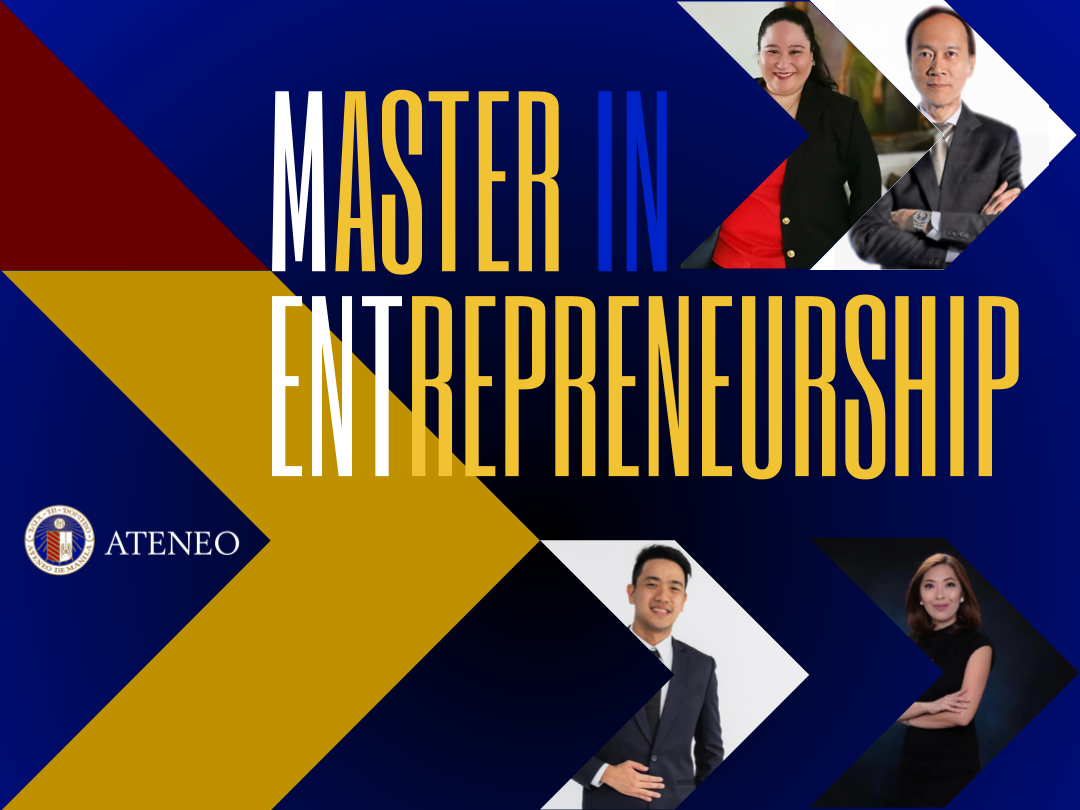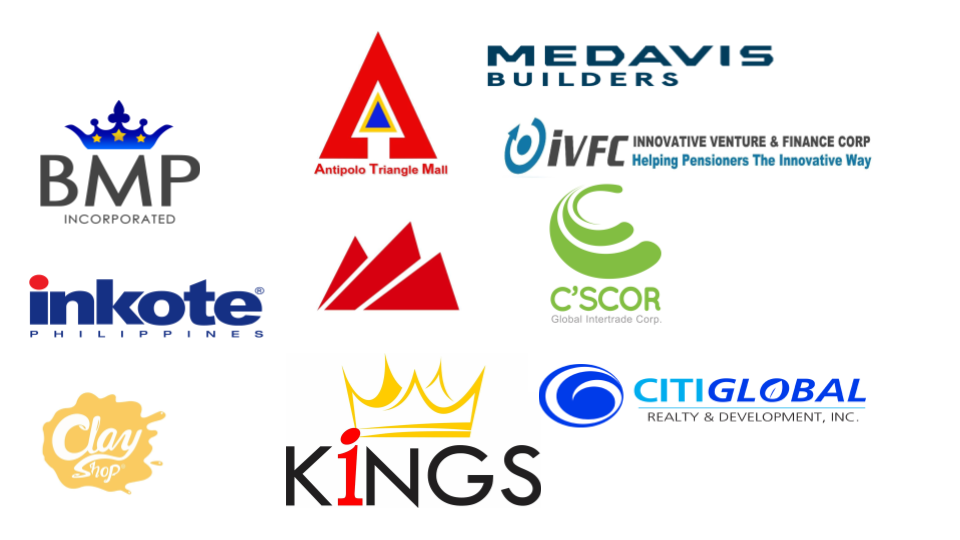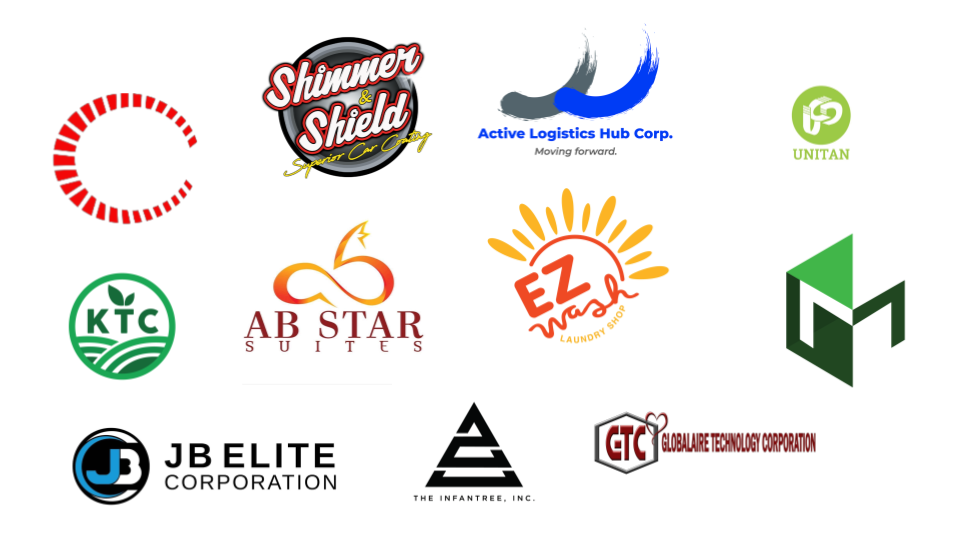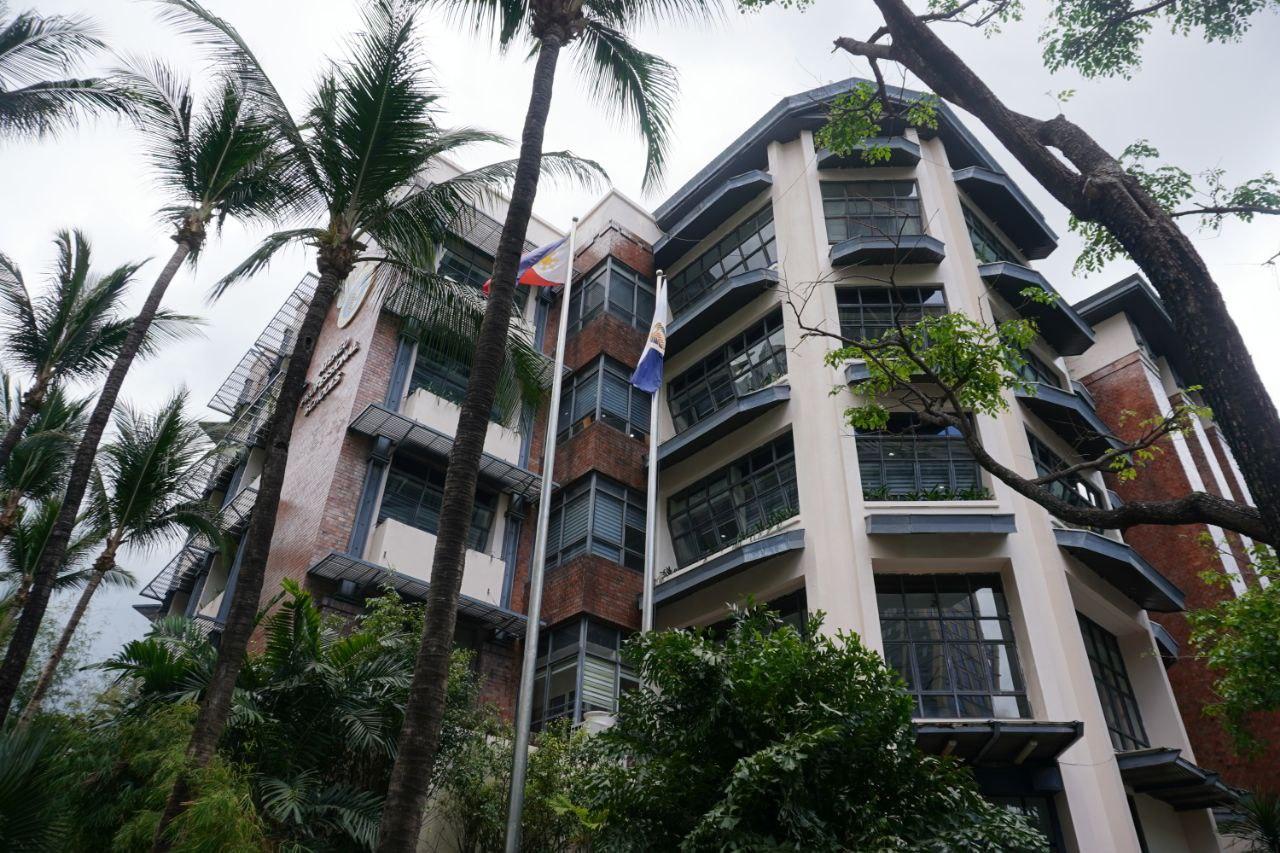About

The Ateneo Graduate School of Business' Masters in Entrepreneurship (MEnt) draws its lineage from a program started by some of the country's most esteemed business educators back in 1999. In July 2009, the program moved to Ateneo GSB under the name Mastering Entrepreneurship for Nation Building, eventually becoming the MEnt program.
Since then more than 30 cohorts have undergone the program composed of varied entrepreneurial profiles including founders, children of owners, corporate entrepreneurs, and social entrepreneurs. For over 25 years the program has constantly revisited and updated its design in order to keep up with the demands of the changing times while being faithful to its basic tenet of real-time learning-by-doing mode of course delivery. This means that when the student-entrepreneurs enroll, they also “enroll” their businesses which become their learning laboratory throughout the course.
Learning Methodology/Delivery
The Mentoring Approach
The program adopts the guru approach, patterned after the Indian educational (mentor) system and the European guild system. Each student-entrepreneur is assigned to a primary guru who will guide them during the 18-month program. In this set-up, the gurus will direct, critique, mentor, and motivate the student-entrepreneurs in developing their businesses. The guru is complemented by Teaching Associates and AGSB faculty, whose task is to assist the student-entrepreneurs in the technical application of the tools learned in the classroom to the student-entrepreneurs’ businesses as well as guidance in the writing of their reports. The entrepreneurial development process adopts a ladder structure in which the apprentice gradually learns the craft of the master by seeing, listening, thinking, asking and doing. Eventually, the student-entrepreneurs rise to the status of the master.
Class Schedule
A school-year calendar is provided to all MEnt student-entrepreneurs upon enrollment to enable them to plan their other activities during their studies. Classes normally begin at 8:30 a.m. and end at 6:00 p.m. Classes are held daily from Monday to Thursday for the first five (5) weeks. It is followed by a total of 31 weekends of 4 to 6 class days a month held every other week. Each class day consists of 5 major sessions for a total of 480 sessions spread over 18 months.
Program Design and Learning Objectives
The MEnt Program is composed of THREE BUILDING BLOCKS and FIVE LEARNING DOMAINS. Modules 1 to 3 have a duration of approximately six months each with a predominant theme for each module:
Module 1: Preparing for Entrepreneurship and Self-Enhancement
This module is the foundation that provides participants the basics of entrepreneuring, management and strategic planning in tandem with the essential Self-Mastery skills of Learning to Think and Learning to Intuit. At the end of Module 1, the student-entrepreneurs are required to pull their findings, analyses and conclusions together for their study of the external environment in the business plan.
Module 2: Creating and Running the Enterprise and Self-Engagement
The action-implementation thrust of Module 2 develops the most appropriate and relevant personal skills such as Learning to Do, Learning to Feel, and Learning to Communicate. The student-entrepreneur is introduced to new product development and evaluating new businesses. The module concentrates on strategy implementation and on all basic and advanced management courses such as Marketing, Operations, Human Resource Management and Managing Costs and Profits. At the end of Module 2, the student-entrepreneurs must be ready to consolidate their research, findings, analyses and conclusions for their comprehensive Internal Assessment (IA) of their enterprises using the ten levels of IA.
Module 3: Growing the Enterprise and Self-Enlightenment
Module 3 brings the student-entrepreneurs to the higher plane of entrepreneurship, one that breaks new ground and shifts paradigms, one that masterfully turns around enterprises on the decline, and one that grows businesses by leaps and bounds. The module challenges the entrepreneur to assume the role of an enlightened leader armed with the convergence of the six self-mastery skills otherwise known as the Learning to Be series. It also integrates the entire strategizing process by completing the research, planning, programming, and implementing sequence. Finally, the student-entrepreneurs are expected to submit their completed five-year business plans.
Each module is further dissected into five learning domains. The domains are the five thematic pillars of the MEnt course. These are the:
- Entrepreneuring Domain
- Self-Mastery Domain
- Functional Management Domain
- Strategic Planning and Management Domain
- Business Plan Domain
These domains will be strategically sequenced within each module, as their various topics and sub-topics become prequels to the preparation of the module’s integrative work, which is, the submission of components of and the whole Business Plan.
Guru
Prof Manuel A Tenmatay

With more than 40 years of work and consultancy experience, 29 years of which he spent at Panasonic Manufacturing Philippines Corporation, Prof Manny developed his expertise in operations management, product development, quality control, corporate planning, information systems, purchasing management, and production engineering prior to joining the academe. Now retired from Panasonic, he continues his journey as a lifelong learner, teacher and mentor at the Ateneo Graduate School of Business and Ateneo School of Medicine and Public Health where he teaches operations management, strategic management, applied mathematics, management statistics, applied management science, quantitative analysis management and business tools. He was recently appointed as guru for Batch 32 of the Master in Entrepreneurship program of the AGSB. In addition, he also serves as a resource person through the corporate and in-house programs of the Ateneo Center for Continuing Education that caters to the learning needs of clients, including GenPact, Profriends, Social Security System, Asian Development Bank, Northern Cement, and GN Power.
Prof Manny holds a degree in electrical engineering from the University of the Philippines and a Master’s degree in electrical engineering at Kyushu University, Fukuoka, Japan as a full scholar under the Japan Ministry of Education. He also earned his Master in Business Administration under the Regis MBA Program at the Ateneo Graduate School of Business where he was recognized as a Gold Medal awardee. He is currently completing his Doctorate degree in Organizational Development and Planning at the Southeast Asia Interdisciplinary Development Institute (SAIDI) under a scholarship granted by the AGSB.
Evaluation of Student Performance
A no-exam, non-quiz program. The performance of each MEnt student-entrepreneur is evaluated every module by a panel consisting of two Gurus and Ateneo GSB panelist. The deliberation is conducted in the presence of the AGSB MEnt Program Director and the MEnt Program Manager.
Submission of reports and conduct of defense
Student-entrepreneurs are expected to submit quality and comprehensive reports at the end of every module (Module1: EA, VMOKRAPI; Module 2: IA, SPATRES, SWOT; Module 3: Business Plan). The student-entrepreneur shall defend these reports in front of a panel composed of his/her primary guru, secondary guru and AGSB faculty.
The modular reports should contain the following minimum requirements:
Module 1: EA, VMOKRAPI
The purpose of the first module MEnt submission is to:
- Situate the enterprise in its proper environmental setting (what business are you in and what is the relevant macro-environment, industry and market of your business?)
- Analyze the past trends in that environmental setting and project the most likely scenario in the next five years. (Remember, a Business plan is primarily what you want to do in the future). The analysis of the past just helps understand the critical variables that have largely affected a business in the past. Determine whether they are the same critical variables most likely to affect the business in the future.
- Base on the reading of the environment for the future, what are the most attractive opportunities (among many) worth pursuing by the enterprise?
Having seen the past and divined the future, what are the Vision, Mission, Objectives, Key Result Areas, and Performance Indicators for the next five years? Are they going to be excitingly different from the present? Is there a paradigm shift?
The report should follow the following process:

Module 2: IA, SPATRES, SWOT
The purpose of the second module MEnt submission is to:
- Evaluate the enterprise using the 10 levels of internal assessment and how these affects Marketing, Operations, Human Resource Management and Managing Costs and Profits. It should contain all the research, analysis, findings, conclusions and recommendations made by the student-entrepreneurs in the course of their work for both the first and second modules.
- Provide additional insight into the value of their products and their business.
- Demonstrate the ability of the student-entrepreneur to implement to actualize concepts or business models. New product or service development should be clearly defined and translated to commercial processes.
- Provide the student-entrepreneurs the major Strengths (S), Weaknesses (W), Opportunities (O) and Threats (T) necessary to construct the SWOT matrix. The SWOT Analysis should, in turn, allow the student-entrepreneurs to generate Strategic Options that are intended to meet the enterprise goals.
Module 3: Business Plans
The purpose of the third module MEnt submission is to:
- Bring the student-entrepreneurs to the higher plane of entrepreneurship, one that breaks new ground and shifts paradigms, one that masterfully turns around enterprises on the decline, and one that grows businesses by leaps and bounds.
- Integrate the entire strategizing process by completing the research, planning, programming and implementing sequence. The student-entrepreneur should be able to synthesize in the sessions on Planning the Enterprise and Establishing the Enterprise.
- Outline how the enterprise can manage change, innovations or turnarounds into actionable programs and allocation of resources. The business plan is completed with an analysis of the student-entrepreneur’s historical financial statements (balance sheet, income statement, and cashflow), their financial projections.
Rating of modular reports
The gurus may rate the business plans as follows:
- Clean pass – Rating given to the student-entrepreneur who submitted an acceptable five-year business plan and is allowed to do the recital and graduate with the batch;
- Not acceptable
- With Minor/Major revisions:
- Student-entrepreneur submits revised copy to the guru within the submission period as stated in the memorandum to qualify for the recital and graduate with the batch;
- Failed
- The revised business plan was found to be still unacceptable even if it was revised and submitted within the submission period;
- Furthermore, the student-entrepreneur has been assessed to be unfit or unqualified to continue with the program due to unacceptable class participation and inability to show application of skills learned.
- When a student-entrepreneur receives this rating, he/she is considered failed from the module and as such will have to repeat the entire module in order to continue with the program. The student-entrepreneur will have to re-enroll in the said module.
- With Minor/Major revisions:
The Ateneo MEnt Experience
Testimonials
"If my father were alive, he would appreciate the professionalization MEnt has taught, such as improving the Service Level Agreement (SLA) across departments, and organizing a logical approach for efficiency as well as people upliftment."
Alex Billan
2nd Generation
Entrepreneur Leader
Jeverps Manufacturing Corp
"During MEnt research I realized that the market opportunity for The Plaza
is not to go out of our class bracket but to grow to the next generation. Once this was clear, I knew what strategies to put in place, what new products and services to offer. It became a guiding light to target the new generation"
Karla Reyes
4th Generation, Aristocrat Family
3rd Generation Entrepreneur
COO, The Plaza
"In MEnt, it’s hard to balance work and classes, but it helps you grow, and apply things you just learned the other day directly to your business. It’s easy because you do it simultaneously."
Eric Darryl Lim
Co-founder
Autokid Truck Solutions
"During my MEnt Internal Assessment (IA), I realized that my personal vision was to create a positive impact on the life of other people and create meaningful connections. It can be a stranger, a friend, a coworker, a family member. I really want to create a positive impact every day."
Katak Manalo
Corporate Entrepreneur
Potato Corner
MEnt Alumni Brands



Contact Details
Ateneo Professional Schools
#20 Rockwell Drive, Rockwell Center, Makati City
Email: entrep.gsb@ateneo.edu
Office Hours
Monday to Saturday 8:30am - 5:30pm
